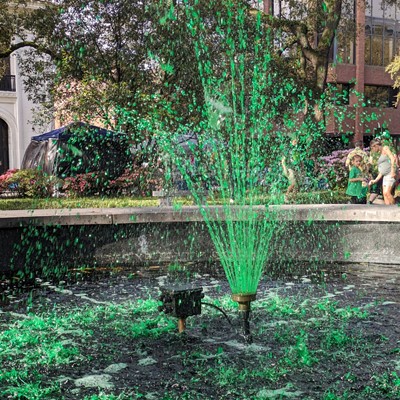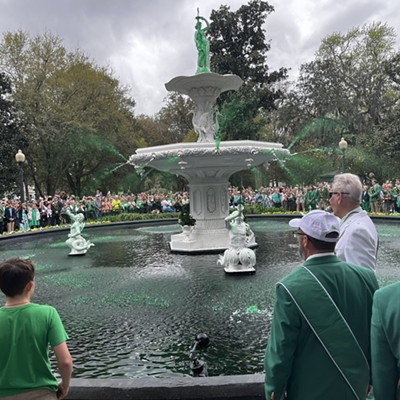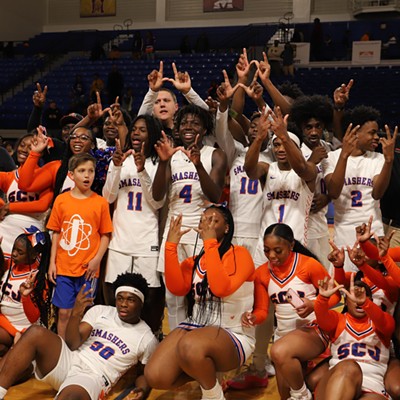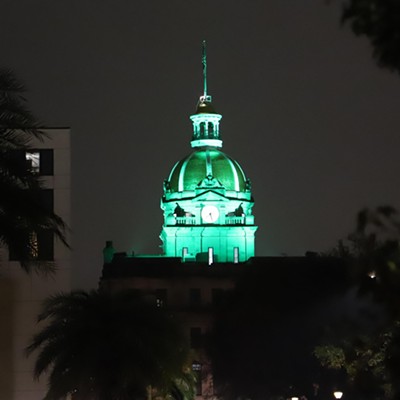FOR DECADES, the Savannah St. Patrick’s Day celebration has been not only our most distinctive calling card to the world, but our most profitable event. It’s arguably our most organic and culturally driven event as well.
The parade and the celebration around it have been referred to as Savannah’s Goose That Laid The Golden Egg for as long as I can remember.
The hotels are full, everyone spends money, and the town swells in size at least three-fold. City employees and police make bank on overtime. For years it was a given that the local bar industry made their profit for the year during that one multi-day celebration.
It’s even good for church donations because of all the lapsed Catholics who attend morning Mass that day!
The whole thing should be an idiot-proof win/win situation. Right?
Maybe not. Over the years, City leaders have occasionally done their level best to try and strangle that golden goose, usually with the best of intentions.
A classic example was the gating of River Street — remember that? — with a price to enter the usually public space.
That fiasco created its own public safety issue with too many people crowded inside the barricades like cattle, with others crowding to get in. Sometimes mounted police had to force crowds back, like a scene from Les Miserables.
You could argue that selling wristbands — making it illegal to enjoy our to-go cup ordinance without paying a fee — was another less-than-brilliant idea to regulate and monetize the event.
We are now seeing the City make another stab at the goose, in the form of a new effort to “take ownership” of the festival, in the words of Alderman Van Johnson. He is supported in this effort by new City Manager Rob Hernandez and Mayor Eddie DeLoach.
The justification they use is... that the City doesn’t make enough revenue from St. Patrick’s Day in Savannah.
Yep, the City Manager and Council are trying to gaslight you into believing there’s not enough revenue to be made at the second largest St. Patrick’s Day celebration in the country, an event somewhat akin to having a license to print money.
This is like saying you can’t find sand in the desert. That’s a you problem.
Undercutting their own argument — and possibly revealing their true motive — the City’s first move towards making the event more profitable for the government was... to cut down the length of the festival.
Because that’s exactly what you do when you’re not generating enough revenue: Further limit your opportunity to generate revenue.
As of this writing, the City will only recognize two official festival days, March 16 and March 17, leaving off the Sunday.
The development has many in the City’s entertainment industry seething. Due to Georgia’s odd state law, cities get one chance a year to let bars open on a Sunday to mark a unique holiday or event. Our leaders chose not to exercise that option for local bars this year.
However, on Sunday, March 18 this year, you might be able to pick up a five-dollar 22-ounce Bud Light — or one, or two, or a dozen — from a tent along the waterfront, even though the bars themselves will have to stay closed.
Regardless, that type of binge-drinking availability, not local bars for those 21 and up, is mostly what has led to the over-imbibing and underage inebriation City Council is now concerned about.
Van Johnson, for example, describes the River Street crowd as being “increasingly younger, and increasingly unsupervised.”
But with all the talk of “ownership” of a supposedly out-of-control festival, why does there seem to be little talk about limiting the availability of cheap, copious beer often sold by non-local vendors?
That’s not all. The City is considering hiring a festival manager or contracting with an outside event management firm.
But if the event isn’t profitable enough, why spend more trying to manage it?
(They conspicuously seem not to have involved the actual Parade Committee in this rather important “stakeholder” conversation. The oversight has caused quite a commotion in those quarters.)
The most egregious example of the City undercutting its own argument came when it defunded Tara Feis, a family-friendly Irish cultural event with a quarter century of local history, which involved no alcoholic beverages at all.
City leaders claim to be concerned about too much drinking, but eliminated one of the few events in Savannah where no alcohol was allowed.
Having navigated the complicated cross-cultural currents of Savannah for a couple of decades as a journalist here, my gut sense tells me that what we’re talking about here isn’t necessarily the City wanting “ownership” at all.
What might be happening is that the new leadership of the City of Savannah, for various political and economic reasons, would like to eventually see the St. Patrick’s Day festival just go away.
They might want to take ownership so they can kill the goose for good — or at least morph it into something unrecognizable.
Before you scoff, think about it:
St. Patrick’s Day is the one truly individualized thing we have left that stands out from the ticketed festivals, the corporate naming rights, the Airbnbs, and the chain stores and hotels which now seem to be the desired package deal for destination cities seeking to appeal to the broadest possible common denominator in consumers.
Our boozy traditional festival, with its ethnic religious roots and its central event run by a faith-based local committee, doesn’t fit the modern mold of sanitized, corporate-sponsored entertainment.
The entire appeal of St. Patrick’s Day in Savannah is that it has many owners. It runs as well as it does precisely because it is a well-married stew of community interests, from the Parade Committee, to the food & bev industry, to local high schools who march, to the churches, to Savannah’s old guard, to our new arrivals.
The City Manager and Council are now telling you on the one hand that the festival is too successful and has to be limited, and also that it’s not successful enough.
A political science professor might call this a type of Hegelian Dialectic: you manufacture a crisis, then offer your own solution to the crisis you created.
In the South we have a less high-falutin’ old phrase: “If it ain’t broke, don’t fix it.”

































